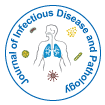Notre groupe organise plus de 3 000 séries de conférences Événements chaque année aux États-Unis, en Europe et en Europe. Asie avec le soutien de 1 000 autres Sociétés scientifiques et publie plus de 700 Open Access Revues qui contiennent plus de 50 000 personnalités éminentes, des scientifiques réputés en tant que membres du comité de rédaction.
Les revues en libre accès gagnent plus de lecteurs et de citations
700 revues et 15 000 000 de lecteurs Chaque revue attire plus de 25 000 lecteurs
Indexé dans
- Google Scholar
- Recherche de référence
- Université Hamdard
- EBSCO AZ
- ICMJE
Liens utiles
Revues en libre accès
Partager cette page
Abstrait
Vector Control Interventions to Prevent Dengue: Current Situation and Strategies for Future Improvements to Management of Aedes in India
Amarjeet Singh and Andrew W Taylor-Robinson
Dengue is the most widespread vector-borne infectious disease of humans, existing in around 125 tropical and subtropical countries worldwide. The causative agent, a Flavirus, is transmitted from one person to another by female mosquitoes of the genus Aedes, primarily Ae. aegypti and Ae. albopictus, which breed in small, still bodies of freshwater such as storage tanks, buckets, plant pots and discarded household waste. Encouraging progress has been made in recent years towards the diagnosis and timely management of this debilitating and sometimes fatal disease. However, in the absence of an antiviral therapy or vaccine that is available and affordable in a low income setting, the means to combat dengue currently rely upon vector control measures that are directed against the immature aquatic stages, larvae and pupae, or adult mosquitoes. Although a number of different methods are in use, vector control has failed to prevent outbreaks from occurring and to avert an expansion of the geographical distribution of dengue. This is due to several limitations of present technologies that relate to dwindling financial resources, development of insecticide resistance, failure of long term sustainability and insufficient community involvement. In this context, there is a pressing need for an evidence-based selection process to determine how best to detect and exterminate the breeding of Aedes mosquitoes. This review considers existing vector control strategies as well as discussing some of the novel approaches that are in preparation, placing particular emphasis on relevance to the worsening public health issue of dengue endemicity in India.
Revues par sujet
- Agriculture et Aquaculture
- Biochimie
- Chimie
- Food & Nutrition
- Génétique et biologie moléculaire
- Géologie et sciences de la Terre
- Immunologie et microbiologie
- Ingénierie
- La science des matériaux
- Le physique
- Science générale
- Sciences cliniques
- Sciences environnementales
- Sciences médicales
- Sciences pharmaceutiques
- Sciences sociales et politiques
- Sciences vétérinaires
- Soins infirmiers et soins de santé
Revues cliniques et médicales
- Allaitement
- Anesthésiologie
- Biologie moléculaire
- Cardiologie
- Chirurgie
- Dentisterie
- Dermatologie
- Diabète et endocrinologie
- Gastro-entérologie
- Immunologie
- La génétique
- Maladies infectieuses
- Médecine
- Microbiologie
- Neurologie
- Oncologie
- Ophtalmologie
- Pédiatrie
- Recherche clinique
- Soins de santé
- Toxicologie

 English
English  Spanish
Spanish  Chinese
Chinese  Russian
Russian  German
German  Japanese
Japanese  Portuguese
Portuguese  Hindi
Hindi